May 15, 2025 | 14:29 GMT +7
May 15, 2025 | 14:29 GMT +7
Hotline: 0913.378.918
May 15, 2025 | 14:29 GMT +7
Hotline: 0913.378.918
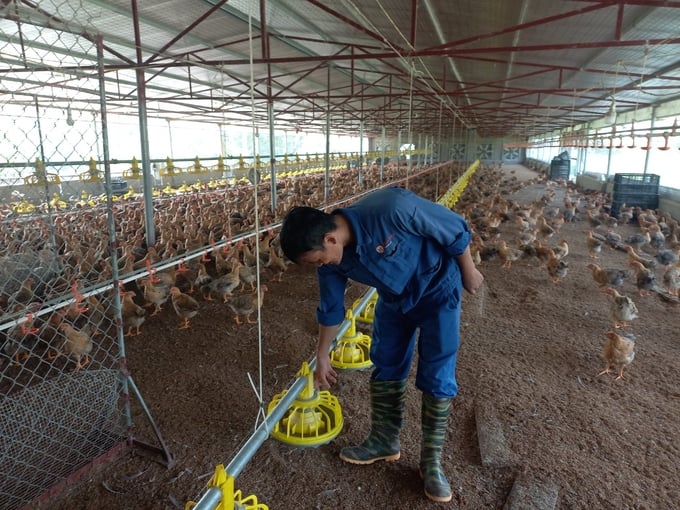
Biosecurity, the solution for livestock farmers in Vinh Phuc. Photo: Hoang Anh.
In recent years, the livestock farming industry in Vinh Phuc has developed in both production scale and professionalism. However, like many other provinces in the Red River Delta, Vinh Phuc livestock farming continues to face challenges such as climate change, complicated disease developments, environmental pollution, and increasing competitive pressures.
Facing the current situation, Vinh Phuc determines that one of the key tasks of the province's livestock development scheme for the period 2022 - 2025 is to apply biosafe livestock production solutions. In other words, biosafe farming is the answer to the problem of small scale, scattered production and environmental pollution in this province’s livestock industry.
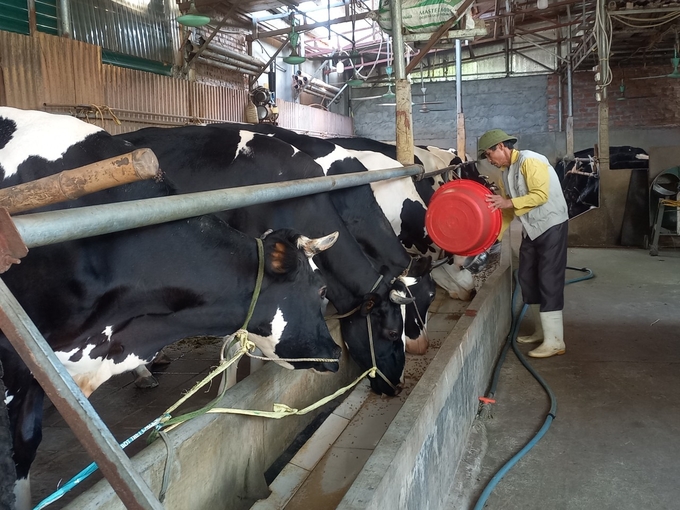
Biosafe livestock production is one of the sustainable production directions Vinh Phuc aims for. Photo: Hoang Anh.
To be more specific, localities will focus on developing livestock production in the direction of industrial farms, applying scientific and technological advances, producing food that meets common food safety standards, targeting Hanoi market and several export markets.
Vinh Phuc’s agricultural sector pays special attention to the issue of reorganizing household livestock farming in the organic and biosafe direction, ensuring environmental hygiene. The aim is to make sure farmer’s livelihoods are secured while increasing the proportion of livestock products on farms and professionalism in the industry.
“Applying biosafe farming procedures is not only a solution for the agricultural industry but also vulnerable livestock farmers. Vinh Phuc province always creates maximum support policies to focus on building biosafe livestock farming models,” said Tran Thanh Hai, Director of Vinh Phuc Department of Agriculture and Rural Development.
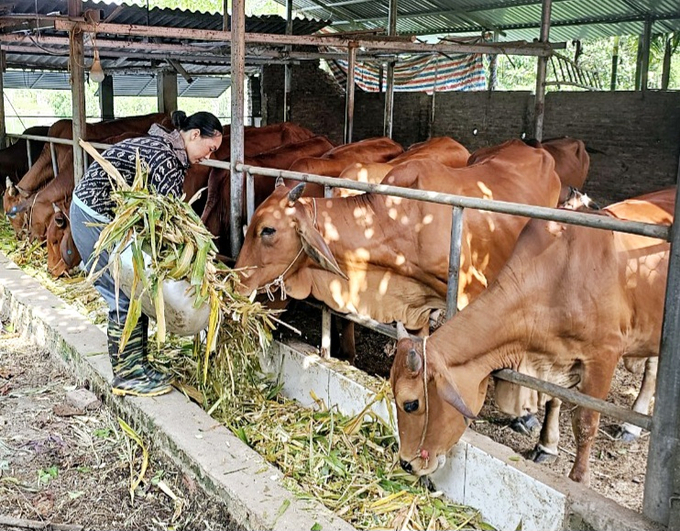
Livestock farming still occupies a large proportion of growth in Vinh Phuc's agricultural industry. Photo: Hoang Anh.
Vinh Phuc is also a pioneer province in supporting livestock farming models that use biological products to reduce environmental pollution. In the period 2021 - 2023, Vinh Phuc province has provided support in the form of biological products for environmental treatment in 105 communes, wards and towns with a total of 15,363 participating households.
The farming procedure using biological products is applied to a total of 21.5 million chickens, 350,000 pigs, 5,000 dairy cows and 2,800 beef cows. A total of 267,100 kg of biological products and 2,520 tons of bedding have been used.
The support policy has made some initial important contributions and created a widespread effect, helping livestock households solve the problem of environmental pollution and gain a better understanding of the importance of waste treatment.
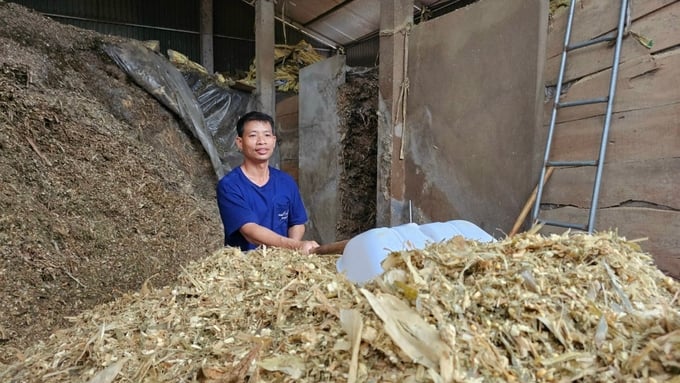
Vinh Phuc’s livestock farming industry achieves economic, technical and environmental efficiency thanks to using biological products. Photo: Hoang Anh.
Vinh Phuc’s livestock farming industry achieves economic, technical and environmental efficiency thanks to using biological products. Photo: Hoang Anh.
Following the calculations of Vinh Phuc Agricultural Extension Center, the success gained from the implementation of the biological product support policy can be seen in three aspects: economic efficiency, technical efficiency and environmental efficiency.
Regarding economic efficiency, farming models of 1,000 commercial colored chickens using biological products as bedding have increased profits by nearly 14%. In a similar manner, commercial pig farming experienced an increase of over 9%, and the cow fattening business witness an increase of over 14%.
On the technical side, thanks to the correct application of biosafety procedures and the use of biological products, despite erratic weather conditions and complicated epidemics in the area, the livestock still grows and develops well.
As for the environment, the use of biological products has had a positive impact on production development, especially in solving common environmental issues caused by livestock farming.
In recent years, Vinh Phuc's agricultural industry has chosen to cooperate with Que Lam Group to build biosafe livestock farming models. As of now, 1,500 pigs in Yen Lac, Tam Duong, and Tam Dao districts are raised by households mixing probiotics into food and using biological bedding.
Yen Lac is the second largest pig raising district in Vinh Phuc. In recent years, epidemics and environmental pollution in livestock farming have always been a constant problem for this locality. After establishing a linkage with Que Lam Group, circular economic models have appeared in Yen Lac’s livestock farming scene, gradually proving how effective the models can be as a solution for household farming.
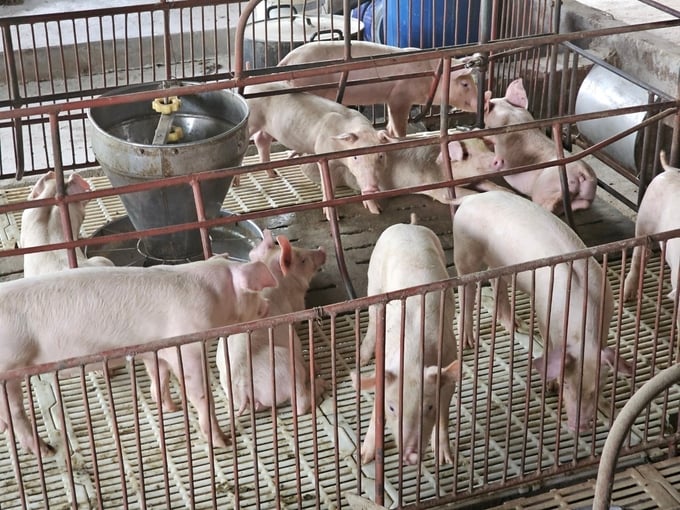
The biosafe livestock model helps farmers in Yen Lac district overcome the issues of epidemics and environmental pollution. Photo: Hoang Anh.
Pham Thi Hao's family is the first organic farming household in Trai Lon, Tam Hong town. Two years ago, Hao registered to implement a circular agriculture model. The model was a combination of livestock production, crop farming and highly intensive aquaculture associated with product consumption linkage.
This is a pilot model implemented by the Vietnam Circular Agriculture Association in collaboration with Vinh Phuc Department of Agriculture and Rural Development and Que Lam Northern Company Limited. After the first year, the model showed clear results. Pigs became healthier and could withstand the epidemic season.
Que Lam Group provided support in terms of inputs, plant and animal care procedures and product underwriting. Each year, Hao's family sells more than 200 pigs at an underwriting price of VND 65,000/kg of pork. Minus investment costs, the profit is approximately VND 1.1 million/pig.
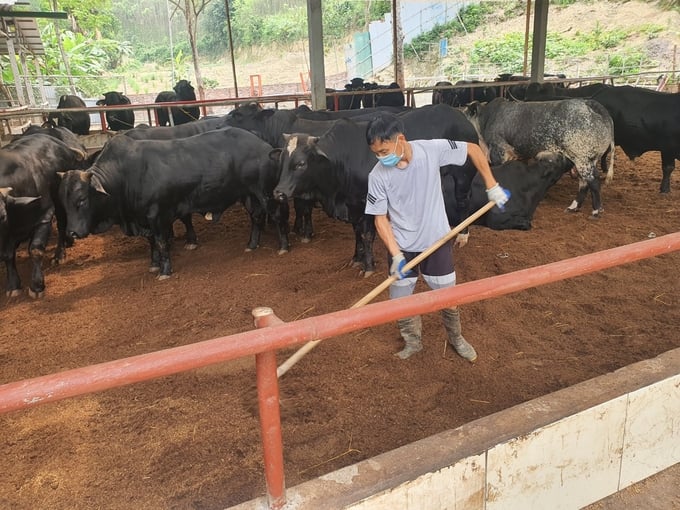
Biosafe cattle farming model in Van Truc commune, Lap Thach district, Vinh Phuc province. Photo: Hoang Anh.
"In all key livestock areas of Vinh Phuc, biosafe solutions are always a prerequisite for the province to develop sustainable livestock production," said Nguyen Hoang Duong, Director of Vinh Phuc Agricultural Extension Center.
Translated by Samuel Pham

(VAN) Data from 10,000 farming households will help professionalize production organization and support the implementation of the One Million Hectares Program for High-Quality, Low-Emission Rice Cultivation.

(VAN) FAO Director-General QU Dongyu marks International Day of Plant Health at NENA conference.

(VAN) Deputy Minister of Agriculture and Environment Hoang Trung affirmed that floriculture and ornamental plants are a growing industry that receives significant global attention.

(VAN) The three staple crops dominating modern diets – corn, rice and wheat – are familiar to Americans. However, fourth place is held by a dark horse: cassava.
/2025/05/10/4037-3-223011_495.jpg)
(VAN) Remote sensing technology is becoming an indispensable tool in monitoring resources, developing modern agriculture, and protecting the environment in Vietnam.
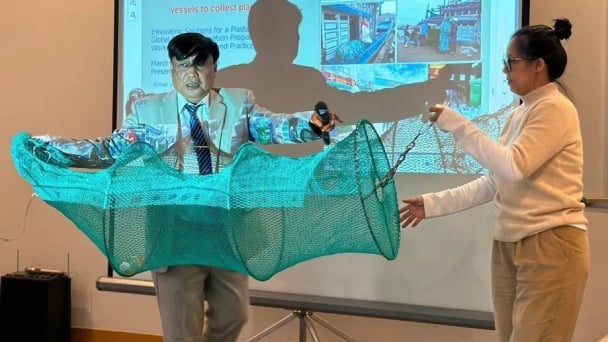
(VAN) The trash bag used on fishing vessels can withstand rough sea conditions, including level 8 to level 10 winds and waves. Notably, it can be hung anywhere on the boat.
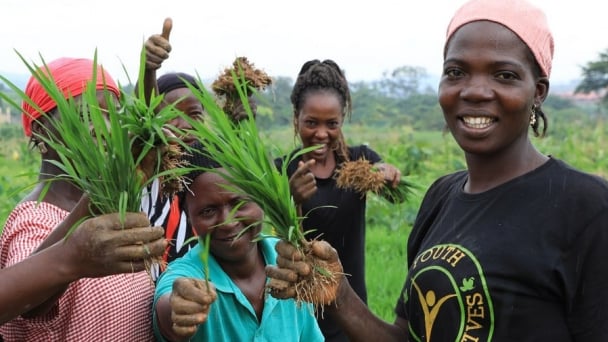
(VAN) African leaders launched the Kampala Declaration on Building Resilient and Sustainable Agrifood Systems in Africa, marking a bold step toward transforming the continent's agriculture.